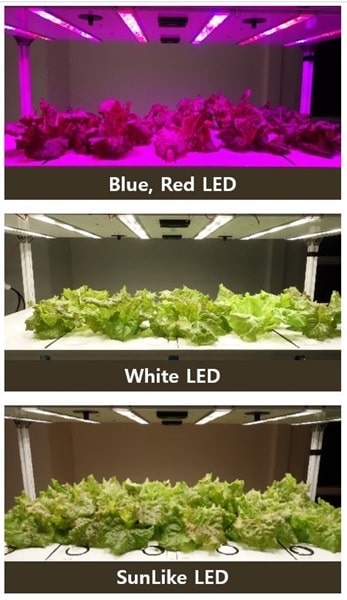SEOUL, South Korea–(BUSINESS WIRE/AETOSWire)– Seoul Semiconductor Co., Ltd. (KOSDAQ:046890), a global optical semiconductor company, announced on December 18 that it has verified through an experiment that natural spectrum lighting can promote stable growth and increase the content of effective nutrients in plants as daylighting does for plants grown in nature.
Seoul Semiconductor used both regular white LED lights and SunLike natural spectrum LED lights to grow lettuce, a vegetable commonly used as a food ingredient. The use of SunLike LED lighting resulted in an increase in lettuce yield and a significant increase in chlorogenic acid and chicoric acid, which are antioxidants and important nutrients, by more than 30% compared to the use of regular white LED lighting.
Seoul Semiconductor has been operating its own plant cultivation and research farm for the past 10 years. It studies growth and nutrient changes in a great variety of plants and nuts brought about by different light sources while measuring nutrients and conducting experiments on the effects of nutrients on cells.
In this comparative experiment, a regular white LED and a light equipped with a SunLike LED similar to a natural light spectrum – both of the same brightness – were installed separately, and the yields of lettuce and the contents of the antioxidants – chlorogenic acid and chicory acid – were compared for 3 weeks. Chlorogenic acid and chicoric acid are known for removing free radicals from the body, suppressing aging and inflammation, and preventing diseases such as aging, reduced vision, Alzheimer’s, and arthritis.
The results show that the yield of lettuce grown under SunLike LED lighting increased slightly by 4% compared to regular white LED lighting, whereas chlorogenic acid and chicory acid increased by 55% and 31%, respectively. This confirms that using lighting closer to natural light in cultivation leads to higher nutrient content in plants.
Light spectrums affect plants and animals. Exposure to artificial light can interfere with frogs’ mating behavior, resulting in mutant tadpoles, and causing a 10-20% decrease in yields of sesame and other fruits. Sunflowers, for which the natural light spectrum was not used, suffered a decrease in bee visits.

